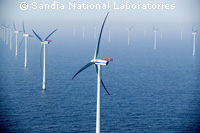R&D investment for renewable energy technologies will ensure sustainable energy mix for Europe
European institutions and industry stakeholders came together on 21 and 22 November for a conference on research into renewable energy for Europe. There was broad agreement on the need for research to contribute to the development of the sector and the reduction in cost of renewable energy technologies in order to meet the challenges of climate change and a secure energy supply. Speaking on behalf of Science and Research Commissioner Janez Potocnik, Pablo Fernandez Ruiz, the Director for Energy at DG Research, opened the conference by sketching out the Commission's plans for renewable energy research in the proposed Seventh Framework Programme (FP7). There would be a major role for Joint Technology Initiatives, the Commission's instruments for accelerating development in key technologies through pan-European public-private partnerships. Hydrogen and fuel cells has already been identified as one area to be supported in this way, while the specific programme proposals explicitly mention renewable energy as an additional candidate for a JTI to be set up during the implementation of FP7. 'Today's research policy provides the knowledge for tomorrow's energy policy', the Commissioner's message stated. 'Our long-term goal is a transformation of the current fossil-fuel based energy system into a more secure, energy-efficient, and sustainable one. Enhancing our knowledge of renewable energy sources through research is an important step to achieving this goal as part of a sustainable energy mix.' The Commission says that it will have invested 440 million euro in research into renewable energy over the course of FP6 between 2002 and 2006, while its proposal for FP7 (2007-2013) asks for 2.93 billion euro under the 'energy' heading of the specific programme on Cooperation. The Commissioner sees the potential for addressing the needs of renewables by, for example, issuing joint calls in the themes of 'energy' and 'environment'. He also believes that Technology Platforms, assembling a critical mass of research, industry, public authority and civil society organisations, 'are set to become powerful actors in EU research policy', with their Strategic Research Agendas already having had significant impact on the shaping of the FP7 proposals. A European Technology Platform is currently in operation for photovoltaic solar power, while a biofuels for transport platform is under preparation and the wind and solar thermal power sectors are also in the process of setting up ETPs. In her introduction, Britta Thomsen, vice chair of the European Parliament's ITRE Committee on Industry, Research and Energy pointed out that the parliament's resolution of 29 September called for the specific programmes of FP7 to include a substantial amount for research into renewables and energy efficiency. She also said that there should be some ring-fencing or a fixed budget set aside for renewable energy research and that this would also help to convince industry to make long-term strategic investments. Speaking on behalf of the UK presidency of the European Council, Energy Secretary Malcolm Wicks emphasised both the challenges ahead and the need for policies to be evidence-based and founded on research, characterising European energy policy as 'the insatiable chasing the renewable'. Referring both to UK national research programmes and to the UK Presidency's chairing of the ongoing discussions on FP7, he emphasised the importance of technology demonstration projects. Pre-commercial testing is a dangerous stage for any technology, he said, and interventions would be needed to help new technologies to bridge this 'valley of death' in order to reach the marketplace. There are few greater challenges than ensuring that energy supply in future is both secure and sustainable, and this will require changes in the ways we generate, transmit and use energy. While there are hard choices to be made, he continued, this represents 'Europe's industrial opportunity'. People tend to think of the Lisbon process in terms of competitiveness and the knowledge economy, he said, but 'if we get it right, there is no reason to think we will not lead the world in the low-carbon economy.'



